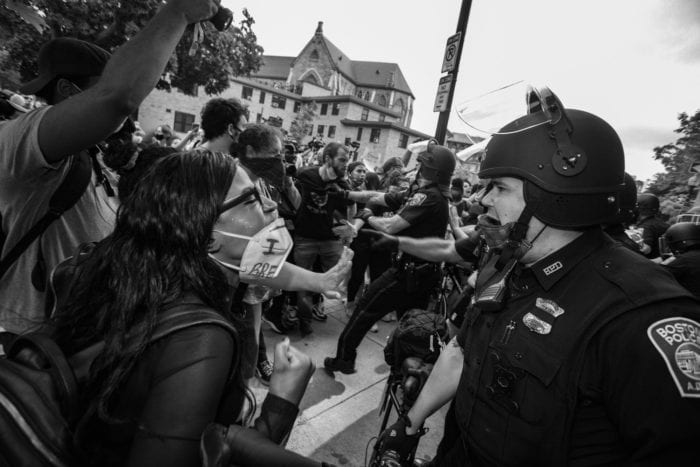
With follow-through, Boston could have a BPD that resembles the force that officials have always pretended we have.
There are two public personas of the Boston Police Department.
First, five o’clock news watchers will recognize the lionized guardians of the common good who politicians smile beside in pictures, lest their families have to worry about Blue Lives Matter venom poisoning their lives back in the district.
Alternatively, there’s the goon squad BPD, that pernicious force of constitutionally questionable evil no matter the metric.
The former is mere propaganda. The latter, from atrocities committed by individual officers to systemic improprieties that have been largely ignored by the regional media and residents beyond squares that are under oppressive surveillance, is reality.
If any of the above huff sounds hyperbolic, just consider the recommendations made by the Boston Police Reform Task Force to Mayor Marty Walsh last week. Compiled in the midst of nationwide protests over state-sanctioned violence and by a task force that actually represented community and activist interests that are typically left out of these discussions—including several family members of people killed by police—the nature of the requests surely reflects the severity of the situation.
Without further ado, here are the five overarching recommendations, in the task force’s (abridged) words:
-
Create an independent Office of Police Accountability and Transparency (“OPAT”) with full investigatory and subpoena power, i.e. the ability to call witnesses and to compel the discovery of documents.
-
Formalize and expand the BPD’s commitment to diversity and inclusion.
-
Expand the BPD’s adoption of the body-worn camera program and continue to ban the use of biometrics and facial recognition software.
-
Enhance the BPD’s Use of Force policies so that they articulate clear and enforceable disciplinary code of consequences for violations and infractions and hold the BPD publicly accountable for the violation of these policies.
-
Adopt practices that maximize accountability, transparency and public access.
In order for those monuments to move, the task force also suggested that the city and the BPD “commit to broader institutional actions and reforms.” Among them: “measure and monitor … progress and enforce consequences”; “critically analyze the capabilities and the expertise of the BPD and determine where responsibilities can be shifted”; “pledge to implement the Task Force’s recommendations without increasing the BPD’s budget.”
Furthermore, the 26-page report thoroughly examines all the aforementioned proposals and more, providing the sort of details and foresight of loopholes that were overlooked in comparable past efforts. Any resident who hopes to keep tabs on progress in this arena ought to read the whole document; in the meantime, having covered the department for more than 15 years, I extracted a few points that jumped off the page in my first couple of reads …
-
Subpoena power. When anybody’s ever asked me how I feel about this reform or that review board in the past, my response has always been something like, If there’s no subpoena power, then it’s a waste of time. In a positive sign this time around, in the city’s public statement on the recommendations, “Mayor Walsh committed to, within the coming weeks, taking the necessary steps to create the [OPAT], including a Civilian Review Board with subpoena power.”
-
Community input. OPAT will have its own administrative arm, as well as “a panel of professionals.” But perhaps most notably, there will also be “a board comprised of civilians (residents) charged with reviewing and recommending action on certain complaints against the BPD and members of law enforcement,” among other tasks.
-
Hiring overhaul. “This change will allow the Boston Police Department to adopt a hiring preference for high school graduates who have received a degree through the Boston Public School systems, METCO, or schools in the Boston Compact.” It’s about time.
-
Unprecedented transparency. You may want to sit down for this one. The task force recommended that the OPAT “review completed investigations by the [BPD’s] Internal Affairs Department,” and “Review and resolve civilian complaints against the BPD within the timeframes recommended.”
Those points and others wouldn’t have been even mentioned let alone considered at this impact level a few months ago, including a suggestion for OPAT to assist the mayor in selecting subsequent commissioners. Such recommendations may all sound within the realm of common sense reform, and they are, but around here that means if they’re implemented at all they will spur a controversial and unprecedented sea change. If there is adequate follow-through to the work done up to this point, Boston could actually have a BPD that resembles the police force that elected officials (and badgelicking members of the Wahlberg clan) have always pretended we have.
BPD Commissioner William Gross is still pretending, of course. In the city’s press release about the recommendations, he claimed his department “prides itself on our community-first policing model.” Which is a joke. If that were the case, basic human rights would be more often recognized than not, and safeguards would already be in place. As would basic transparency measures; for starters, there’d be no need for nudges like, “The BPD should be required to report use of force data, including weapons discharges, to the appropriate state and federal agencies in as timely a manner as prescribed. In addition, this data should be made available to the public via the dashboard10 and other reporting mechanisms, such as an annual report.”
Gross and the inevitable departmental resistance aside, I am uncharacteristically hopeful. At the very least, the city’s recommendations are concessions in and of themselves—that the BPD is brutal, that there is no legitimate transparency whatsoever, and that up until this point, every barricade imaginable has been thrown up in the face of possible reform. If a fraction of these recommendations materialize in a meaningful way, the Boston Police Department as it exists today will be utterly unrecognizable, which is as noble a goal as any.
As Walsh said in a statement to the media, “We must commit now to transformational, systemic change. … Now it is Boston’s charge to take these bold reforms and use the Task Force’s recommendations to create a better, more just city.”
As long as by “Boston’s charge” the mayor means the responsibility of his administration and the BPD, I couldn’t agree more.
A Queens, NY native who came to New England in 2004 to earn his MA in journalism at Boston University, Chris Faraone is the editor and co-publisher of DigBoston and a co-founder of the Boston Institute for Nonprofit Journalism. He has published several books including 99 Nights with the 99 Percent, and has written liner notes for hip-hop gods including Cypress Hill, Pete Rock, Nas, and various members of the Wu-Tang Clan.

